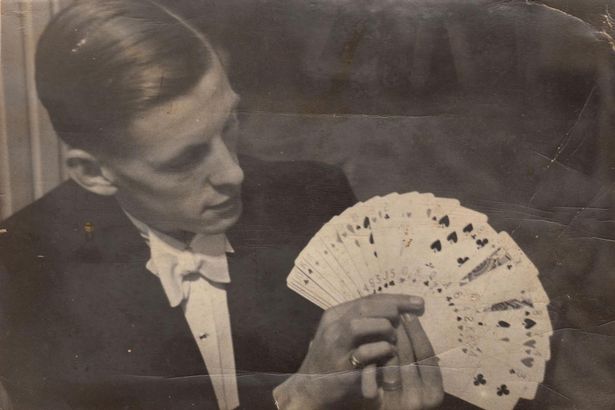Fergus Anckorn who, during WWII, used magic as a means of saving both his own life and the lives of those around him, was born on 10 December 1918 at Dunton Green in Kent. His interest in magic seems to have begun early, probably from the time he was given a box of tricks on his fifth birthday. He loved magic and became good at it, enjoying surprising and entertaining his friends.
As war clouds gathered over Europe, Fergus was one of many young men from the South London area who enlisted, spending two years in Britain with the 118th Field Regimental Army Unit which was formed to accommodate them. He continued to perform magic and spent much time entertaining his fellow comrades.
The 118th was sent to India but was redirected to Singapore as re-enforcement for the troops there. Their arrival in Singapore was nothing less than a disaster, as the position of the Allies was untenable. No sooner had the 118th disembarked in Singapore than they were dive-bombed by the Japanese. Fergus managed to jump into the dock, but when he emerged it was to find that a number of his friends had been killed.
Less than a week later, Fergus was driving a truck when it was blown up by a bomb blast and he received a heavy blow to the head, a bad wound in the back of the leg – but worst of all for a conjurer, his hand was almost severed. It was thanks to an orderly who recognised him in time that the surgeon did not amputate the hand as he was intending to. It was shortly after that – on the 15th February 1942, that Singapore fell to the Japanese.
So it was that when Fergus came to, he found himself in the Alexander military Hospital – he still had his hand – but the Japanese had taken over the hospital. He was still very ill when he most incredibly, escaped the dreadful massacre in the hospital, perpetrated by the Japanese. They entered the hospital moving from bed to bed and bayoneting the patients to death. Neither the staff nor the doctors were spared. It is told that a surgeon, busy operating in the theater, together with his anaesthetised patient was similarly dispatched.
Altogether, one hundred and fifty persons were slaughtered. Fergus tells of the horror of knowing what was going on, of putting his pillow over his head and of waiting for the inevitable. However – he was missed out – the Japanese went straight past him. Fergus attributed this miraculous escape to the fact that his wounds were bleeding so dreadfully at the time that they must have thought that he had already been ’eliminated’. He said of that terrible day – “When I came round everyone was dead except for me.”
Fergus was subsequently taken prisoner, along with other soldiers from the 118th Field Regiment Royal Artillery. The prisoners were treated abominably and cruelly maltreated. Food was scarce, forcing prisoners to eat anything they could find – from maggots to scorpions, from snakes to mice – and thousands of men starved to death.
A Japanese camp commandant once ordered Fergus to perform some magic for visiting generals which entailed the use of an egg. He was sent to the cook from whom he managed to get 50 eggs. You can imagine the relish with which his starved friends feasted on a 49-egg omelet. The trick went off very well – but the following morning he was brought before the commandant who wanted to know where the other 49 eggs were. Fergus really thought his time had come and imagined his severed head rolling across the floor. From somewhere Fergus found the words:
“Your trick was so important to me, I was rehearsing all day.”
And so – magically – he escaped death once more.
Just prior to the release of all prisoners, Fergus remembers when he and four others were hustled into the jungle by their Japanese guards who lined them up in front of a machine gun and prepared to shoot them. They waited for 10 agonising minutes while the guards argued amongst themselves before seemingly changing their minds. They were taken back to the camp where they were told that the war had already been over for three days
Fergus Anckorn is aware of how fortunate he has been and he is very grateful to be alive. He says:
“I am probably the luckiest man alive. I’ve been blown up. I’ve been shot at. I’ve survived a massacre. And I also got away with that egg trick. Every day is a wonder to me.”
